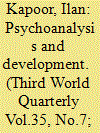|
|
|
Sort Order |
|
|
|
Items / Page
|
|
|
|
|
|
|
| Srl | Item |
| 1 |
ID:
136947


|
|
|
|
|
| Summary/Abstract |
To a great extent, popular representations of Indo–Australian relations have been viewed through the lens of CRICKET – the national game in both countries. Despite a proliferation of writing on colonial Indian CRICKET, Australia’s contribution to it has been largely ignored. In October 1935, a team of cricketers embarked on the first Australian tour to the subcontinent.1 The tour was conceived and FINANCED by the Maharaja of Patiala to assist preparation of an official Indian team to tour Britain in 1936. In this paper, I will draw upon primary sources and interviews to help articulate the complex colonial relationship between the East and the West, whilst locating the ambiguous position of Australia within this. Despite predominantly conforming to the Orientalist view that Westerners considered themselves a superior ‘race’, the Australian cricketers demonstrated an atypical cultural sensitivity to the Orient and the ‘Other’.
|
|
|
|
|
|
|
|
|
|
|
|
|
|
|
|
| 2 |
ID:
136938


|
|
|
|
|
| Summary/Abstract |
This essay questions the enduring difficulties of addressing racism within the current politics of integration in Europe, with a specific focus on the Portuguese context. The analysis centres on integration initiatives to promote employability among the Portuguese Roma and the ways in which they are rationalised by employment gatekeepers and decision-makers. This rationalisation depoliticises racism by constantly shifting the focus to the presumed characteristics of the ‘other’, re-enacting white-privileged notions of nationhood, Portugueseness and Europeanness. Accordingly, projects based on ‘activation of social competences’, ‘empowerment’ and ‘interculturality’ are implemented as a civilising and disciplinary programme aimed at correcting the presumed deficiencies in ethnically marked populations. The analysis aims to contribute towards a much needed debate on the notion of integration and the re-articulation of the historical legacies of racism in contemporary European democracies.
|
|
|
|
|
|
|
|
|
|
|
|
|
|
|
|
| 3 |
ID:
136949


|
|
|
|
|
| Summary/Abstract |
The cultural significance of ‘ethnic-specific’ CRICKET teams and leagues has received limited scholarly attention, despite increasing evidence of their various social functions. This article aims to contribute to this under-researched area by drawing upon two individual case studies of Pakistani Muslim CRICKET teams; the first is based in the UK and the second in Norway. In this article we argue that leisure and sport are key spaces for the delineation of social identities and hierarchies. We identify how CRICKET represents a significant social network within both the British and Norwegian Pakistani communities. In particular, we articulate the role of cricket in establishing and maintaining friendships and relationships, bolstering a sense of belonging, initiating diasporic sentiments, as well as being significant in the development of social capital, and resisting institutionalised white privilege.
|
|
|
|
|
|
|
|
|
|
|
|
|
|
|
|
| 4 |
ID:
134636


|
|
|
|
|
| Summary/Abstract |
International development has tended to ignore – or, tellingly, repress – human/social passions. Yet the theory and practice of development is replete with disavowed memories (racism, (neo)colonialism, gender discrimination) and traumatic prohibitions (economic recession, poverty), which show up in dreams and fantasies (the exoticised Third World, structural adjustment as universal panacea), obsessions (economic growth, ‘wars’ against poverty or terror), or stereotypes (denigration, infantilisation, sexualisation or feminisation of the Third World Other). Psychoanalysis aims precisely at helping tease out these passions, that is, the unconscious fantasies and desires embedded in development. It helps explain the gap between development’s scientific commitments (eg belief in progress, neutrality, objectivity, rationality) and its irrational practices (eg the seductive draw of narrow capitalistic growth, the fatal pull to aggressive racism, or the blind conformity to bureaucratic procedures or ethnic/religious identities). It helps us understand that development is not only a socioeconomic construction, but also an ideological construction intent on effacing its various internal traumas and contradictions – for example, the way in which development is “naturally” equated with neoliberal growth and liberal democracy, concealing the reality of rapacious capitalism, growing global inequalities and unevenness, and diminishing avenues for political contestation. The five articles in this sub-theme for Third World Quarterly aim to examine the intersection of psychoanalysis and development, applying in particular (although not exclusively), a Lacanian/Žižekian lens to a range of development issues.
|
|
|
|
|
|
|
|
|
|
|
|
|
|
|
|
| 5 |
ID:
135875


|
|
|
|
|
| Summary/Abstract |
Racism has been in sharp decline in recent decades yet the word, as accusation, is used more than ever. The word/idea needs to be more restrictively defined and kept for when it is really needed. When almost everyone is a racist, no one is. To this end we need to distinguish more clearly between the greater comfort people often feel among familiar people and places and active hostility towards outsider ethnic groups. We also need a more discriminating language to describe the spectrum of discrimination. Prejudice, clannishness—even in some instances discrimination itself—should be regarded as sentiments and behaviours that are distinct from proper racism.
|
|
|
|
|
|
|
|
|
|
|
|
|
|
|
|
|
|
|
|
|